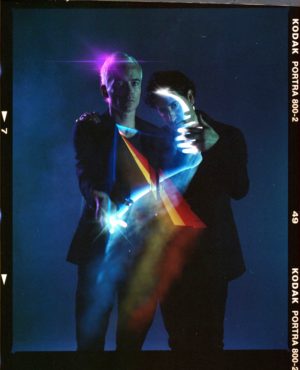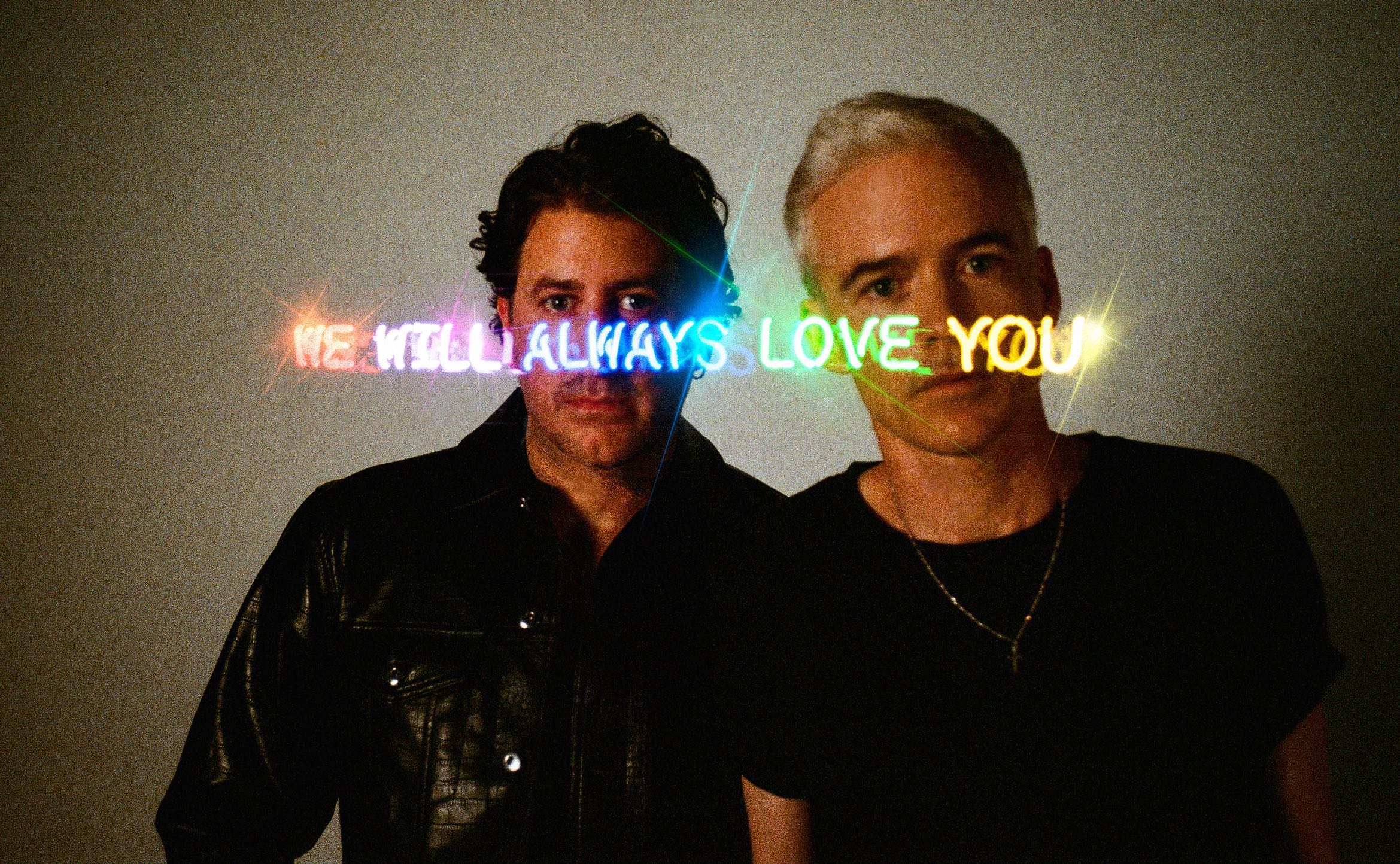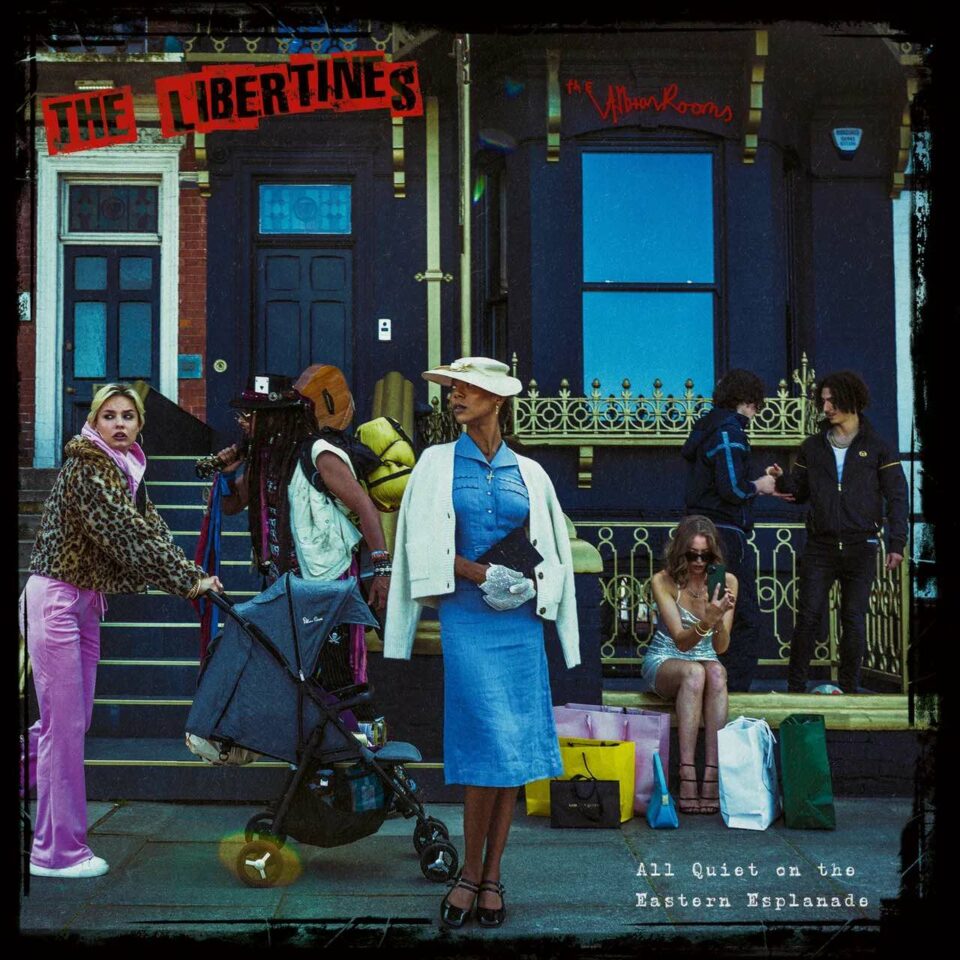The East Coast in January’s bitter winter—on the verge of 2021’s first major snow storm—is a far cry from the summer simultaneously being experienced by Australia. “Aw, sorry, mate,” says Tony Di Blasi during a Zoom chat calling in from Melbourne. “We’ve been under the planet’s most intense lockdown the whole of 2020 what with COVID, so we know how you feel,” says Robbie Chater, seated next to Di Blasi. “We’re sending you warm vibrations.” One could argue that those very same warm vibes—tinged with an intimate romanticism and big, broad love’s universality—are what Di Blasi and Chater are preaching on The Avalanches’ rich new album We Will Always Love You.
A blunter and more emotionally and intellectually ruminative affair than their famed, fun 2000 debut Since I Left You with its mood-swinging 900 samples (as well as their long-awaited follow-up, 2016’s Wildflower), with their new record The Avalanches have created something more thoughtful and dear with fewer samples. They’ve focused their attention on supple, contagious melodies and a lovelorn script to convey to a handsome lot of guest vocalists: Rivers Cuomo, Dev Hynes, Perry Farrell, Karen O, Leon Bridges, along with duet and trio pairings from Denzel Curry, Tricky, and Sampa to Neneh Cherry and Jamie xx, all follow The Avalanches lead in their message of love with musicians such as Kurt Vile, Johnny Marr and The Clash’s Mick Jones playing along.
By the time our too-brief chat is over, beyond knowing how much love and communion means to The Avalanches 21 years since the project started, one revelation is how damned polite Di Blasi and Chater are as conversationalists. If “nice” was a chartable commodity, TikTok and Spotify’s tops would be The Avalanches.
Going over your history, I noticed how even-tempered you’ve been to those who wondered why you took sixteen years between albums one and two.
Tony Di Blasi: I do think we’re pretty even tempered, but also we genuinely don’t mind people’s curiosity or telling the story of that journey, either.
Robbie Chater: Yeah, we weren’t making music during that whole time, and we did have personal ups and downs. It’s often like therapy talking about it.
Considering that journey, and how long the two of you have been together, what sort of expectation and energy do you have going from record to record?
Chater: Our roles do change over the course of the relationship and the project at hand, but the core relationship stays the same—how we discuss things, how we find our way through to the finish line. For instance, on this most recent album, I wound up doing a lot of correspondence with the vocalists and other collaborators, while Tony might be busy configuring the running sequence of the album. That was totally different from what we did on Wildflower where we both did the same jobs at the same time.
Di Blasi: It’s just such an easy friendship that everything flows naturally. We just treat each other with respect and a lot of trust, and it just comes together. We have faith and confidence in the fact that, together, we can meet any challenge. There’s no challenge we can’t meet. Anything we want to do is possible—together.
“We have faith and confidence in the fact that, together, we can meet any challenge. There’s no challenge we can’t meet. Anything we want to do is possible—together.” —Tony Di Blasi
The new album bursts with melody. Was that a goal from the start, going from sampling and more diverse moods to something sharper and more directly song-oriented?
Di Blasi: It was spontaneous. We felt satisfied, had a real sense of achievement at having made two beautiful sample-based records, a collage-based tapestry. Coming to this new album we wanted to be open to new experiences, more people, new processes. Because we were so open, things just unfolded. This could not have been our goal from the beginning, though.
Chater: Sample-based records like those first two are also very time-consuming to make. We were thinking of ways in which we could cut back time between records, say from sixteen years to four years.
So greater efficiency was key to We Will Always Love You?
Chater: Yeah. We wrote a lot with our other musical collaborator Andy [Szekeres, co-writer and keyboardist]. That relationship changed how this new record would sound as well, to say nothing of the guest vocalists. We don’t really talk in technical terms when Tony and I operate. We have our own language—we talk about feeling. We just never thought we could meet and work with anyone who speaks similarly.
Di Blasi: And we might not stay here either. We may do something different next. For all the vocals we have on this album, the next one may have none. Though we’re busy with this new album, and of course catching up on some sleep, I can already feel my own sparks of excitement at what could come next. In the coming months, we’ll know what that means.
Chater: Plus, it was joyous and a real change for us. Instead of being alone, like on Since I Left You, with a stack of records and a sampler after a long day, the new one was just a nice change of energy.
Di Blasi: Andy never forced his way in. He’s just cool at what he does. Respectful of the history of The Avalanches, that it’s our band, but just a relationship that is easy, without catch-ups or contracts.
You said the new music was based on a feeling. Without making it so black and white, what is the feeling of the new one as opposed to the last two?
Chater: I think there’s always one element of our sound that’s joyous, and always sounds as if we’re ready for a party. This new album, though, comes from a more introspective place.
Di Blasi: It encapsulates a lot. The feelings of joy and love are an underlying thing in everything we do, but this album is like we’ve grown up. Factoring in all of the Avalanches records, and that sweet spot we have between the happy and sad, this new album’s feelings are perhaps a bit more mature. You know how the earlier albums have wackier, crazier songs on them? More youthfully exuberant?
Chater: A bit nuts.
Di Blasi: This one is calmer.
Chater: The first two albums were all about joy. This one also acknowledges the painful side of life, without dwelling on it. The beauty here is more beautiful because it can be fleeting.
More ups and downs, a rounder set of emotion and music to go with it. Realer.
Chater: This record is maybe broader in its emotions.
Di Blasi: We were going through so much pain during Wildflowers sometimes, the crazy big songs painted over the hard times we were going through. This one, we’re mature enough to acknowledge the hurt.
“The first two albums were all about joy. This one also acknowledges the painful side of life, without dwelling on it. The beauty here is more beautiful because it can be fleeting.” —Robbie Chater
As you sifted through that wealth and breadth of emotion, what can you tell me about having to curate vocalists who could convey those messages?
Di Blasi: Every song of ours is started in that way, with maybe a sample and some chords as the basis of the track, and from there we’ll think for ages who would be best over the melody. The track we have going dictates the voice. We don’t have a list of people for an album. Each song leads the way.
If we’re talking about sadness, poignancy, and real emotion, we have to discuss the late David Berman, who wrote words on “Dial D for Devotion” on the new album, as well as having appeared on Wildflower.
Chater: We never met David, but we were pen pals. During the making of Wildflowers, we would correspond, sometimes about life, or he would guide me if I was going through a tough time in life, or the struggles of addition. He sent positive vibes and wise words, some of which became his contributions to Wildflower. His book, Actual Air, and his music meant so much to me—such an extraordinary talent. When we were talking about the new Avalanches album, he would talk to us about working on his own new Purple Mountains album, how some of his lyrics might fit our music, how some of his themes might resonate with ours. It was really lovely, too, that he got to hear them before he passed.
You talked about maturity and the wealth of emotions on Love You. Beyond the natural aging process, why does this new album embrace all that? Why do you believe that now was the right time to make something loving and unironic, and how did you convey that vibe to your collaborators?
Di Blasi: My feeling when we write is unironic, and wears its heart on its sleeve, an expression of love and light. There’s useful craziness on the other two albums, but they’re no less sincere for it. This record is just a purer distillation of our feelings. I think with time you get better at doing that distillation. It’s so lovely, too, to hear you say that the new one sounds unironic because that is what we’ve always tried to do. That’s funny you said it like that. Robbie kept saying from the start that we had to make this from the heart.
Chater: Write it from the heart. Record it from the heart. Follow the heart.
Di Blasi: It almost became like our mantra. What does the heart think about the music? And Robbie just sent out notes to all of our collaborators about what each song felt like, and what it should convey.
Chater: Rather than do an album where everyone talked about a million different things, this one had a point, expressing feelings, with everyone on the same page. FL










